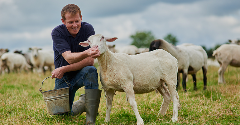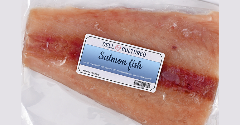News
Confirmed: California bans four ‘toxic’ food additives
10 Oct 2023Four food additives, including the colouring Red No. 3, will be banned in food in the US state of California over safety concerns, with public health campaigners hoping this will spark a nationwide ban in the coming years.
The carcinogenic food dye Red No. 3, brominated vegetable oil, potassium bromate, and propylparaben will no longer be allowed in foods sold in the state of California, following California Governor Newsom’s signing of the bill AB 418.

The California legislation makes California the first state in the US to prohibit the use of these additives in packaged foods despite the fact that they are currently deemed safe by the Food and Drug Administration (FDA). Food manufacturers have until 2027 to comply.
Potassium bromate is an oxidising agent used as a flour improver in processed baked goods, such as bread while propyl paraben is a preservative. Brominated vegetable oil is used as an emulsifier in citrus-flavoured drinks to prevent the flavours from separating while Red Dye No. 3 is a red food colouring.
All the additives have been linked to serious health problems, such as a higher risk of cancer, nervous system damage, and hyperactivity, and have all been banned for use in food in the EU with the exception of Red No. 3, which can be used in candied cherries.
An original draft of the bill, approved by the California Assembly’s Committee on Environmental Safety and Toxic Materials in April this year, also proposed to ban titanium dioxide, used to impart an opaque white colour to food, drink, and supplement but this was not included in the final version.
Hopes that nationwide legislation will follow
Non-profit civil society organisation, the Center for Science in the Public Interest, said it hoped the California legislation would inspire similar efforts around the country and prompt the FDA to eliminate the four additives.
California has a history of setting precedence when it comes to food safety and public health regulations in the US. In 2008, It banned artificial trans fats – present in partially hydrogenated oils (PHOs) – from food sold in restaurants and foodservice but it was not until 2015 that the FDA ruled PHOs were not safe for use in food.
Similar legislation is pending in New York State via a bill that proposes banning the same additives included in the California law.
Speaking of Red Dye No 3, CSPI president Dr Peter G. Lurie said: “Most people would be quite surprised to learn that a known carcinogen is banned for use in lipstick but still widely used in thousands of foods, including many candies, baked goods, and drinks marketed to children.
“California has corrected that absurdity for Californians, and, if past is prologue, the impact of this law will reverberate throughout the nation and at the FDA.”
National Confectioners Association: ‘Soundbites over science’
The National Confectioners Association (NCA) said in a statement that California was once again making decisions “based on soundbites rather than science”.
“[The] approval of this bill will undermine consumer confidence and create confusion around food safety. This law replaces a uniform national food safety system with a patchwork of inconsistent state requirements created by legislative fiat that will increase food costs. This is a slippery slope that the FDA could prevent by engaging on this important topic. We should be relying on the scientific rigour of the FDA in terms of evaluating the safety of food ingredients and additives.”
The Californian bill was proposed by Jesse Gabriel, chair of the Assembly Committee on Privacy and Consumer Protection, who previously sought to alleviate fears voiced by food industry opponents of the bill that it would result in the prohibition of certain candy and other confectionery products.
“There is no realistic chance that this bill will result in Skittles or any other product being pulled off the shelf,” he said. “The idea here is for these companies to make minor modifications to their recipes so that these products no longer include dangerous and toxic chemicals.”
Related news

California companies required to disclose heavy metal content in baby food
10 Jan 2025
As of January 2025, baby food manufacturers selling in California must disclose test results for four heavy metals – arsenic, lead, cadmium, and mercury – via an on-pack QR code.
Read more
Snack trends, ingredient claims, and plant-based perceptions: Highlights from Fi Europe 2023, part 1
7 Dec 2023
Value-led snacking, sustainability storytelling, and the importance of having a ‘star ingredient’: we asked consumer analysts and market experts at Fi Europe about the trends and innovations that are shaping the food industry.
Read more
Advocacy groups condemn EU Commission for backpedalling on animal rights
3 Oct 2023
Amid rumours that the EU may abandon its plans to improve animal welfare in farming and end the use of cages, many stakeholders have condemned this possibility and urged the EU to reconsider.
Read more
Poland and Ukraine attempt to resolve grain dispute
29 Sep 2023
Poland and Ukraine have begun talks to try to resolve a dispute regarding the ban on Kyiv’s grain imports that prompted Kyiv to file a lawsuit to the World Trade Organization.
Read more
The EU may be set to scrap its sustainability commitments
27 Sep 2023
A speech delivered by President Ursula von der Leyen last week inferred that the EU could be drawing back on its commitments to create a more sustainable and healthier food system.
Read more
Industry first: Mosa Meat becomes first cultivated meat startup to gain B Corp certification
11 Sep 2023
A first for the industry, Dutch cultivated meat company Mosa Meat announced that it has received B Corp certification and will soon apply for regulatory approval across the globe.
Read more
German supermarket trials climate-centric pricing model
29 Aug 2023
German discount supermarket Penny has trialled increasing product prices to mirror their health and environmental costs.
Read more
EPR fee delay spurs concerns over UK’s sustainability commitment
8 Aug 2023
The UK government’s decision to push back the introduction of fees for the Extended Producer Responsibility (EPR) due to inflation has raised doubts about whether this sustainability commitment will ever be realised.
Read more
Latino-owned food startups tackle climate change
25 Jul 2023
A growing list of Latino-founded food and beverage startups in the US are putting sustainability at the forefront of their businesses for the sake of the planet.
Read more
Industry first: The Netherlands approves cultivated meat and seafood tastings
17 Jul 2023
The Netherlands has become the first country in Europe to approve tastings of cultivated meat and seafood in controlled environments, yet there is still a long way to go before widescale commercialisation is achieved.
Read more